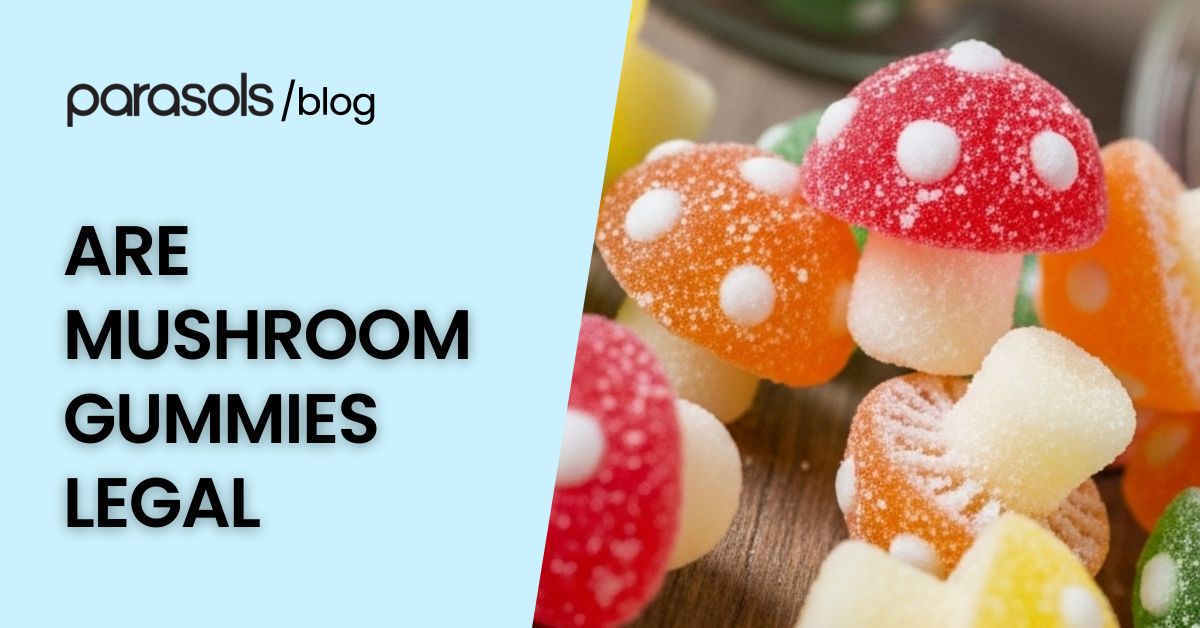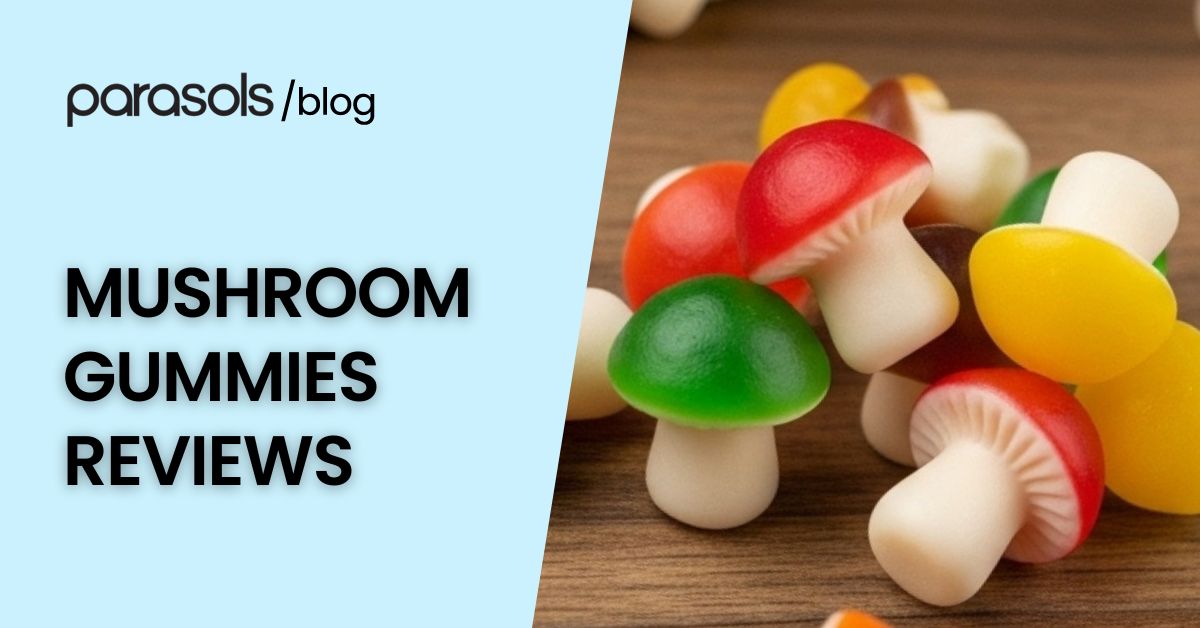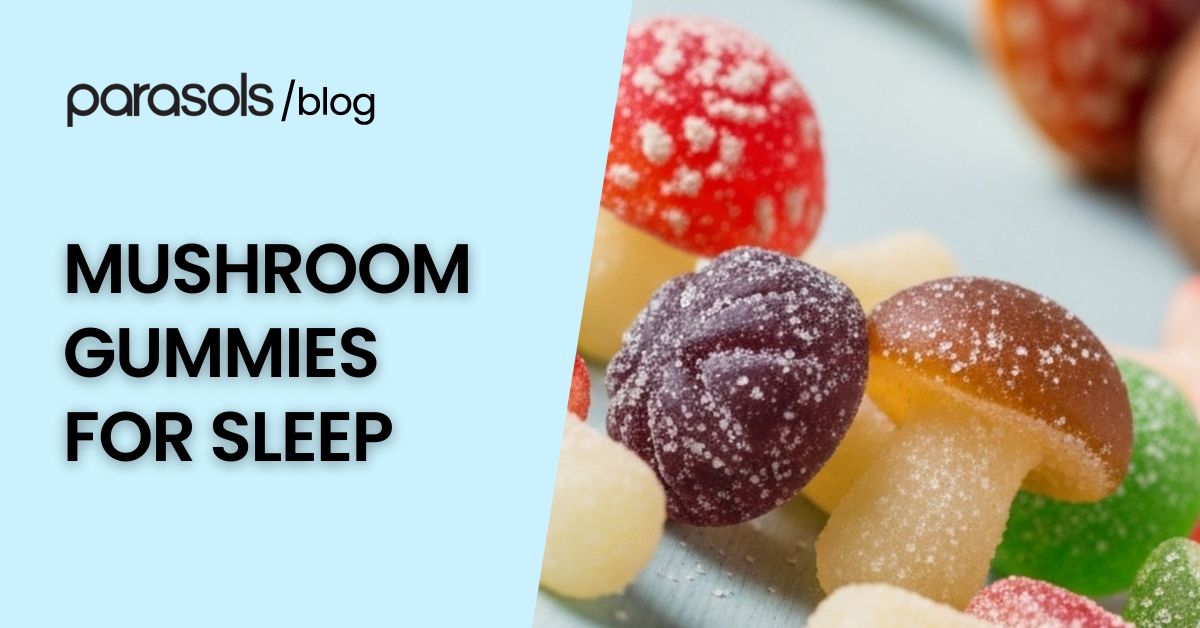Mushroom gummies are gaining popularity as a convenient and tasty way to consume functional and psychedelic mushrooms—but their legal status can be confusing. The question begs, are mushroom gummies legal? Whether they’re made with psilocybin or adaptogenic fungi like lion’s mane or reishi, it’s important to understand the legal landscape before buying or using them. Here's what you need to know.
Overview of Mushroom Gummies
Mushroom gummies are edible supplements infused with mushroom extracts, available in two main types: functional mushrooms (like lion’s mane, reishi, and cordyceps) and psychedelic mushrooms containing psilocybin. Parasols offer high quality mushroom gummies like our wildberry non detect mushroom gummies.
Functional mushroom gummies are typically marketed for wellness benefits such as focus, immunity, and stress relief, while psilocybin gummies are sought for their psychoactive effects. These gummies offer a discreet, flavorful, and easy-to-dose alternative to traditional mushroom consumption.
Legality of Magic Mushroom Gummies
The legal status of magic mushroom gummies in the United States is complex and varies by jurisdiction. While psilocybin—the psychoactive compound in "magic mushrooms"—is classified as a Schedule I substance under federal law, some states and cities have enacted laws to decriminalize or permit its use under specific conditions.
Key points regarding the legality of magic mushroom gummies:
- Federal Law: Psilocybin remains illegal under federal law, classified as a Schedule I controlled substance, indicating a high potential for abuse and no accepted medical use.
- State-Level Legalization: Oregon and Colorado have legalized psilocybin for therapeutic use under regulated programs.
- Decriminalization Efforts: Several cities, including Denver, Oakland, and Seattle, have decriminalized the possession of psilocybin, making it the lowest law enforcement priority.
- Amanita muscaria Products: Some mushroom gummies contain Amanita muscaria, which contains psychoactive compounds like muscimol. These compounds are not scheduled under federal law, but the FDA has issued warnings about their safety and legality in food products.
- Regulatory Uncertainty: The FDA has not clearly defined the regulatory status of mushroom edibles, leading to a gray area in their commercial production and sale.
States Where Mushroom Gummies are Legal

The legal status of psilocybin-containing mushroom gummies varies by state. As of now, the following states have enacted laws permitting the use of psilocybin under certain conditions:
- Oregon
- Colorado
Note: While other states and cities have decriminalized psilocybin, legalization for therapeutic or recreational use is limited to the states listed above.
States Where Mushroom Gummies are Banned
While some areas are moving toward decriminalization or regulated use, many states continue to strictly prohibit psilocybin in any form, including gummies. These states enforce criminal penalties for possession, sale, or manufacture.
- Idaho
- South Dakota
- Kansas
- Texas
- Georgia
- Tennessee
- Indiana
- Iowa
- Wyoming
Magic Mushrooms Vs Functional Mushrooms
Magic mushrooms and functional mushrooms may share a natural origin, but their uses, effects, and legal status are very different. Here’s a quick comparison to help distinguish between the two:
|
Feature |
Magic Mushrooms (Psilocybin) |
Functional Mushrooms (Non-Psychoactive) |
|
Active Compound |
Psilocybin (psychedelic) |
Beta-glucans, hericenones, triterpenes, etc. |
|
Primary Effect |
Hallucinogenic, alters perception and mood |
Enhances wellness: boosts focus, immunity, energy |
|
Common Species |
Psilocybe cubensis, Psilocybe cyanescens |
Lion’s Mane, Reishi, Chaga, Cordyceps |
|
Legality |
Mostly illegal federally; decriminalized in some areas |
Legal and widely available |
|
Use Case |
Mental health therapy, spiritual exploration |
Daily health supplements, stress relief, brain health |
|
Form Available |
Dried, capsules, gummies, chocolates |
Powders, capsules, teas, gummies |
Tips Before Taking Magic Mushrooms
Before trying magic mushrooms, especially in gummy form, it’s essential to prepare both mentally and physically for a safe and insightful experience.
- Know the Source – Only use mushrooms or gummies from trusted sources to avoid harmful adulterants or incorrect dosages.
- Start Low, Go Slow – Beginners should take a low dose and wait before considering more, as effects can take time to peak.
- Set and Setting – Ensure you're in a safe, comfortable environment with minimal stress and distractions.
- Have a Sober Companion – It’s best to trip with a trusted friend who remains sober and can offer support if needed.
- Stay Hydrated – Drink water and eat lightly before the experience, but avoid alcohol or other substances.
- Check the Law – Make sure you're informed about the local legal status of psilocybin before using it.
- Be Mindful of Mental Health – Avoid using psychedelics if you're experiencing significant emotional distress or mental health challenges without guidance.
Final Thoughts

Mushroom gummies offer a convenient way to examine both functional wellness and psychedelic experiences, but understanding their legal status is crucial. With laws rapidly evolving, staying informed helps you make safe and responsible choices. Always research your local regulations and consider consulting professionals when in doubt.
If you're curious about trying mushroom products, start by learning the difference between legal functional varieties and restricted psychedelic ones.
Frequently Asked Questions
Are mushroom gummies safe to consume?
Mushroom gummies made from functional mushrooms like lion’s mane or reishi are generally considered safe when sourced from reputable brands and taken as directed. However, magic mushroom gummies containing psilocybin carry psychological and physiological risks, especially in high doses or for those with mental health concerns. Safety depends heavily on product quality, individual health, and context of use.
Do mushroom gummies expire?
Yes, mushroom gummies do expire. Most come with a shelf life of 6 months to 1 year, depending on ingredients and storage conditions. Exposure to heat, air, or moisture can degrade potency and flavor. Always check the expiration date and store them in a cool, dry place to preserve effectiveness and safety.
Can I travel with mushroom gummies?
Traveling with mushroom gummies depends on their ingredients. Functional mushroom gummies are typically legal and safe to carry within the U.S. However, gummies containing psilocybin are federally illegal and can result in criminal charges if found during travel, especially at airports or across state lines. Always check local laws and TSA guidelines before packing any mushroom-related product.
Will mushroom gummies make me fail a drug test?
Functional mushroom gummies will not cause you to fail a drug test, as they contain no banned substances. However, psilocybin can be detected in certain drug tests, though it's not commonly screened for in standard employment tests. If you're using psilocybin products, it’s best to assume there's a risk if drug testing is a concern.
Are there age restrictions for buying mushroom gummies?
Yes, depending on the type. Functional mushroom gummies can often be purchased without age restrictions, especially in wellness stores. However, psilocybin-containing products—where legal—are restricted to adults, usually 21 and over, and are typically available only through licensed therapeutic programs or dispensaries with strict guidelines.



Leave a comment
This site is protected by hCaptcha and the hCaptcha Privacy Policy and Terms of Service apply.